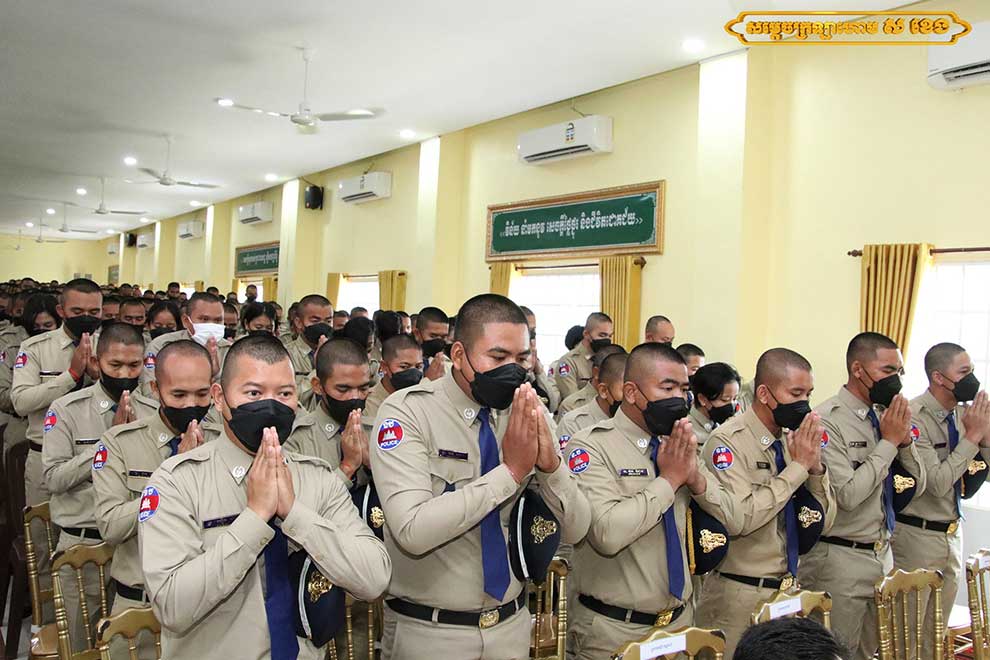
Police officers complete their training with an event held at the training school in Battambang province on October 27. SAR KHENG VIA FACEBOOK
Minister of Interior Sar Kheng has introduced new mechanisms to recruit local police officials through verbal tests given at interviews without having to do a written test.
Civil society organisations have said that the recruitment of police officials should depend on entirely on that person’s abilities and experience rather than personal connections or nepotism by higher-ranking authorities.
Speaking at the closing ceremony for the 15th graduating class for police vocational training last week, Sar Kheng said that during the Covid-19 pandemic they had experimented with changing methods from a written test to a verbal interview with positive results.
He said that after seeing the benefit of the interviews, he decided to allow them to use that method.
“We consider the interview to be more helpful and more effective for the recruitment of officers into our police departments. I’ve requested that the exam not be held, but we must conduct a personal interview with each candidate. Commune chiefs are in charge of interviews and commune police chiefs conduct the interviews according to a list of questions we’ve provided,” he said.
He said that for the recruitment of officers into the police framework at the local level, candidates who are from the commune they are applying in were to be given recruitment priority because they have a clear understanding and awareness about their locations and it is easier for them to do the work.
“For example, a commune lacks two police officers. They do not need to go and take an written entrance examination so we can recruit the children of the residents of that commune. We generally refrain from recruiting our own children, but that is not very important. What is important is that they have enough ability and are qualified,” he said.
He stated that the candidates who take the examination must not be involved in drugs in any way and must go through a comprehensive background check.
“The candidates must have their health and their urine checked. If the check reveals any signs of drug use then we absolutely won’t allow them into the police framework. For example, then we have police that seize drugs and instead they smoke the drugs themselves. This is already a problem and that’s why we must be clear about it,” he said.
Pech Pisey, executive director of Transparency International Cambodia, said that the change in the exam methods was not an issue, but more importantly the process of recruitment must be transparent and the applicants must all be provided with equal opportunity to vie for the jobs.
“The recruitment of police officers should depend on that individual’s personal capacities and experience rather than getting job offers through have a well-connected family and nepotism because in the past there have been allegations of nepotism. So, no matter what the exam methods are we must make sure that all candidates have equal rights,” he said.
He added that the recruitment of civil servants was not totally transparent because of the problems with the testing process and because there are other ways aside from the test to enter the civil service framework.
“So, to eliminate that problem, the ministry should inspect and monitor that exam. If possible, there should be participation by the anti-corruption unit (ACU) because some other exams already involve the ACU,” he said.
Deputy national police chief Pen Vibol who also heads the Personnel Department could not be reached for comment.
However, a police official who asked not to be named given the sensitive nature of the topic, said that a verbal interview is good because it can help reduce irregularities in the exams with the grading of the exam papers.
“Because the written exams have had many irregularities and the answer sheets can be altered. If it is a verbal test it will be better able to prove that the individuals who undergo the interview are really capable of answering these questions,” he added.
However, he said that the interview alone is not enough. The candidates must have the knowledge and other skills depending on which Personnel Department organises and holds the test.
“We do need people with knowledge of writing, reading, listening. If they just know how to speak, but actually they don’t know how to write letters that’s not good enough,” said the police official.








